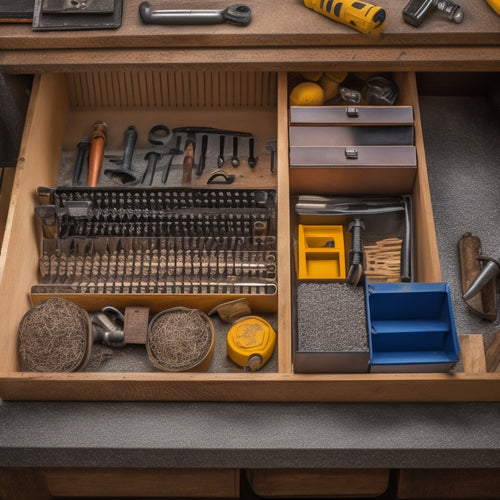
Planning a Workshop With a Professional Organizer
Share
When planning a workshop with a professional organizer, you'll want to start by researching and selecting the right organizer for your project, ensuring their credentials, experience, and communication style align with your needs. Next, clearly define your workshop objectives and goals, creating a roadmap for success. From there, develop engaging content, set realistic timelines, and choose the ideal venue for your event. You'll also need to establish a budget structure, prepare for logistics, and plan for participant engagement strategies. By following these steps, you'll be well on your way to a successful workshop - and there's more to learn about each of these vital steps.
Key Takeaways
- Research and select a professional organizer with the right credentials, experience, and communication style for your workshop needs.
- Clearly define workshop objectives and goals, establishing a roadmap for success and guiding content development and participant engagement.
- Create engaging workshop content with a mix of interactive activities, prioritizing clarity and concision, and ensuring alignment with defined objectives.
- Establish a realistic timeline, allocating sufficient time for each task, and leaving room for flexibility to accommodate unexpected delays.
- Set a comprehensive budget, tracking expenses, and prioritizing debt management to ensure effective resource allocation and financial goal achievement.
Choosing the Right Organizer
Planning a Workshop With a Professional Organizer
Choosing the Right Organizer
With your workshop goals and objectives in mind, you're now ready to find the right person to bring your vision to life - the organizer. This individual will be responsible for designing and carrying out a workshop that meets your needs, so it's important to choose someone who's a good fit.
Start by researching potential organizers' credentials, experience, and communication style to confirm they align with your requirements. Understand their organizing philosophy and approach to workshop design to gauge if it connects with your vision.
Assess their personality fit by reviewing past projects, client testimonials, and their engagement strategies. Don't forget to check their availability schedule to verify they can commit to your project timeline.
Defining Workshop Objectives Clearly
When planning a workshop, you need to define clear desired outcomes that specify what you want to achieve.
To do this, you'll need to set specific, measurable goals that can be accomplished during the workshop.
Clear Desired Outcomes
At least 80% of successful workshops can be attributed to one essential element: clearly defining the desired outcomes.
You'll want to take the time to identify what you want to achieve with your workshop. What do you want participants to take away? What do you want to accomplish? Defining these outcomes will help you create a clear roadmap for your workshop and guarantee everyone involved is on the same page.
To help you clarify your desired outcomes, ask yourself these questions:
| Desired Outcome | How to Achieve |
| Identify key skills to improve | Conduct an outcome assessment to determine current skill levels |
| Increase participant engagement | Incorporate interactive activities and solicit participant feedback |
| Develop a clear action plan | Provide a template for participants to outline their next steps |
| Enhance collaboration | Design group activities that cultivate communication and teamwork |
Specific Measurable Goals
Now that you've clarified your desired outcomes, it's time to drill down into the specifics. Defining your workshop objectives clearly is essential to achieving success. You need to set specific, measurable goals that will guide your planning and guarantee you're on track to meet your desired outcomes.
To do this, ask yourself what you want to achieve during the workshop. What're the key takeaways you want participants to leave with? What skills or knowledge do you want them to acquire? Be precise and specific when setting your goals. Instead of "improve communication skills," for instance, set a goal like "participants will be able to articulate their ideas clearly and concisely in a group setting."
Having measurable outcomes will enable you to track progress and assess the success of your workshop. You can use metrics like surveys, feedback forms, or quizzes to evaluate the effectiveness of your workshop.
Effective goal tracking will help you refine your approach and make adjustments as needed. By setting clear, specific, and measurable goals, you'll be able to create a workshop that meets your objectives and provides a safe and productive learning environment for participants.
Setting Realistic Timelines
Five key milestones will dictate the pace of your workshop planning: setting a realistic timeline, securing a suitable venue, recruiting participants, preparing engaging content, and allocating resources.
To set a realistic timeline, you'll need to prioritize tasks, allocate sufficient time for each, and leave room for flexibility. Remember, unexpected delays can occur, and having a buffer will help you adjust without compromising your overall plan.
Here are some essential considerations for your timeline:
-
Deadline adjustments: Be prepared to make changes as needed to guarantee you're on track to meet your goals.
-
Timeline flexibility: Leave some wiggle room in your schedule to accommodate unexpected setbacks or opportunities.
-
Task sequencing: Determine the order in which tasks need to be completed, and schedule accordingly.
- Time blocking: Allocate specific time slots for each task to maintain focus and avoid multitasking.
Creating Engaging Workshop Content
With your timeline in place, you can focus on crafting content that will engage and inspire your workshop participants. This is where you'll explore deeper into the meat of your workshop, creating a thorough outline that covers all the essential topics.
Start by identifying the key takeaways you want participants to leave with, and then build your content around those goals. Make sure to include a mix of interactive activities, such as group discussions, role-playing, and hands-on exercises, to keep participants engaged and motivated.
Don't forget to leave room for participant feedback and Q&A sessions, which won't only provide useful insights but also help you adjust your content on the fly. Remember to prioritize clarity and concision, avoiding jargon and technical terms that might confuse or intimidate your audience.
Selecting the Ideal Venue
Your workshop's success hinges on selecting a venue that complements your content and caters to your participants' needs. You want a space that's not only accessible but also provides the right ambiance for your workshop.
When choosing the ideal venue, consider the following factors:
-
Location convenience: Is the venue easily accessible by car or public transportation?
-
Capacity requirements: Can the venue accommodate your expected number of participants comfortably?
-
Technological needs: Does the venue provide the necessary audio-visual equipment and internet connectivity?
- Layout preferences: Does the venue offer flexible seating arrangements and sufficient breakout rooms?
Additionally, think about parking availability, nearby accommodations, and venue accessibility for participants with disabilities.
Establishing a Budget Framework
You'll need to establish a budget structure to guarantee your workshop stays financially on track.
This involves setting clear financial goals, which will help you determine how much you can afford to spend on various aspects of the event.
Next, you'll allocate expenses, making certain you're assigning resources effectively to achieve your goals.
Financial Goal Setting
Establishing a budget structure is an essential step in planning a successful workshop, as it allows you to define financial boundaries and allocate resources effectively.
To set financial goals, you'll need to assess your current financial situation and identify areas for improvement. This involves evaluating your income, expenses, debts, and savings.
Consider the following key aspects of financial goal setting:
-
Savings strategies: Identify ways to build an emergency fund, and allocate a portion of your income towards long-term savings and retirement planning.
-
Debt management: Prioritize debt repayment, focusing on high-interest loans and credit cards, and create a plan to become debt-free.
-
Investment planning: Investigate investment options that align with your financial goals, such as wealth-building assets or income diversification.
- Budgeting techniques: Develop a budget that accounts for all expenses, ensuring you're allocating resources efficiently and effectively.
Expense Allocation Plan
With your financial goals in mind, it's time to create an expense allocation plan that outlines how you'll distribute your income towards different expenditures. This plan will serve as a roadmap for your workshop's financial management, guaranteeing you allocate resources effectively.
Start by identifying your funding sources and categorizing your expenses into needs and wants. Conduct a cost analysis to determine the budget breakdown for each expense category. This will help you prioritize and make informed decisions about resource allocation.
Expense tracking is vital to monitor your spending and stay within your budget. Regularly review your financial forecasting to confirm you're on track to meet your goals.
Consider the investment return on each expense to maximize your budget. By following these steps, you'll create a thorough expense allocation plan that guarantees a financially secure workshop.
Preparing for Workshop Logistics
As the workshop date approaches, several logistical details require your attention to guarantee a seamless and productive experience for attendees.
You'll need to verify that everything runs smoothly, from the setup to the wrap-up.
Here are some key logistical considerations to keep in mind:
- Venue and Setup: Arrange for a comfortable and accessible space that can accommodate your expected number of attendees.
Confirm the layout, seating, and audio-visual equipment to support your participant engagement strategies.
- Catering and Refreshments: Plan for meals, snacks, and refreshments that cater to diverse dietary needs.
This will help keep attendees energized and focused throughout the workshop.
- Materials and Supplies: Prepare all necessary materials, including handouts, worksheets, and writing utensils.
Make sure you have a plan B in case of unexpected shortages.
- Technical Support: Identify a reliable technical support team to troubleshoot any issues with equipment, internet connectivity, or presentation software.
This will minimize downtime and guarantee a seamless experience.
Frequently Asked Questions
What Is the Ideal Participant-To-Organizer Ratio for a Productive Workshop?
When designing a workshop, you'll want to guarantee an ideal participant-to-organizer ratio for maximum engagement and personalized attention. Aim for 6-12 participants per organizer, allowing for effective engagement strategies and feedback mechanisms to promote a safe, productive, and interactive learning environment.
Can I Customize the Workshop Content to Fit My Organization's Brand?
You're not limited to a one-size-fits-all approach; you can tailor the workshop content to fit your organization's unique branding like a glove, ensuring branding alignment and content personalization that connects with your team, making it a million times more effective!
How Do I Ensure Workshop Materials Are Accessible for Participants With Disabilities?
You guarantee workshop materials are accessible by following accessibility guidelines, creating inclusive materials, and considering diverse needs, so you can confidently provide a safe and engaging experience for all participants.
Are There Any Specific Technology Requirements for a Successful Workshop?
When hosting a workshop, you'll need reliable technology to engage participants. Make certain you have access to virtual tools, such as video conferencing software, and quality audio equipment, like microphones and speakers, to facilitate a smooth and inclusive experience.
Can the Professional Organizer Help With Post-Workshop Implementation Support?
You'll want to guarantee you receive post-workshop implementation support, which can include a post-workshop evaluation and ongoing support to help you stay on track, and a professional organizer can definitely provide that, giving you peace of mind.
Conclusion
As you tie up the loose ends of your workshop planning, remember that a well-structured event is like a puzzle - every piece must fit perfectly for the bigger image to emerge. With a professional organizer by your side, you've set the stage for a productive and engaging experience. Now, take a step back, visualize the entire process, and watch your vision come to life, piece by piece, like a work of art unfolding before your eyes.
Related Posts
-

Storage Bins for Shelves to Keep Clutter at Bay
You're looking for a way to keep your shelves organized and clutter-free, and storage bins are the perfect solution t...
-

Best Screw Storage Bins for Organizing Your Toolbox
You need a reliable screw storage system to maximize your productivity and efficiency, and that's exactly what the ri...
-

Top Rolling Tool Box Drawers for Maximum Storage
When it comes to maximizing storage with rolling tool box drawers, you need a solution that combines durability, cust...


